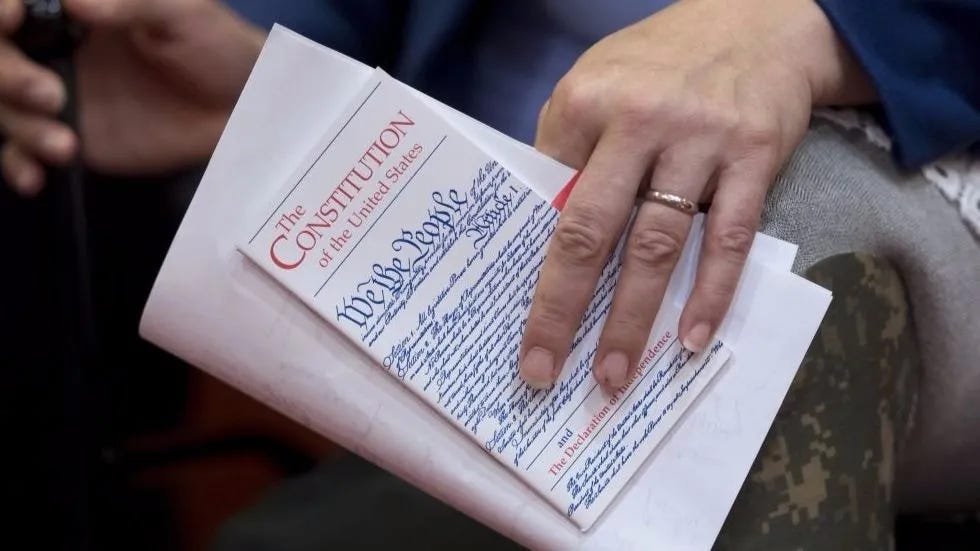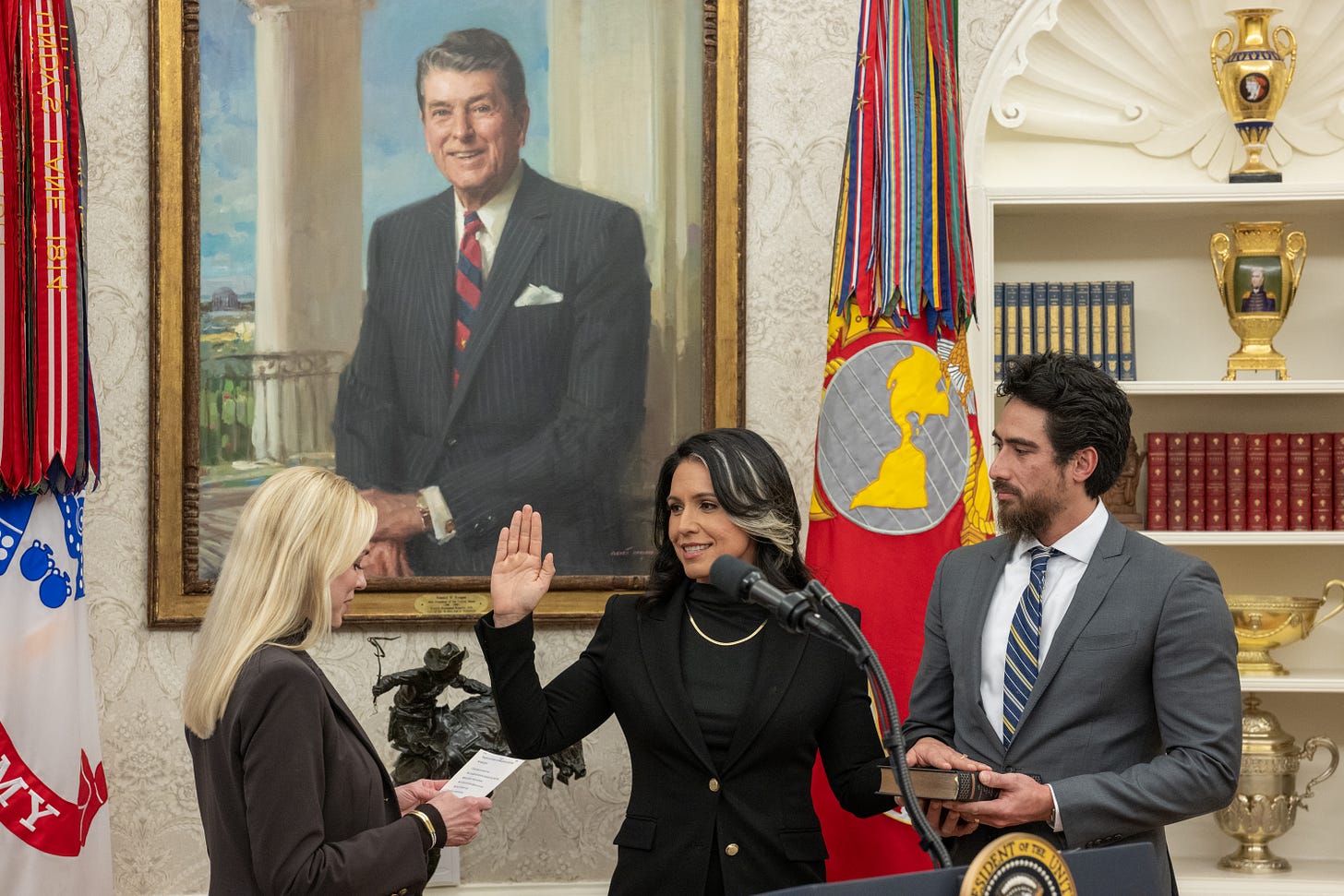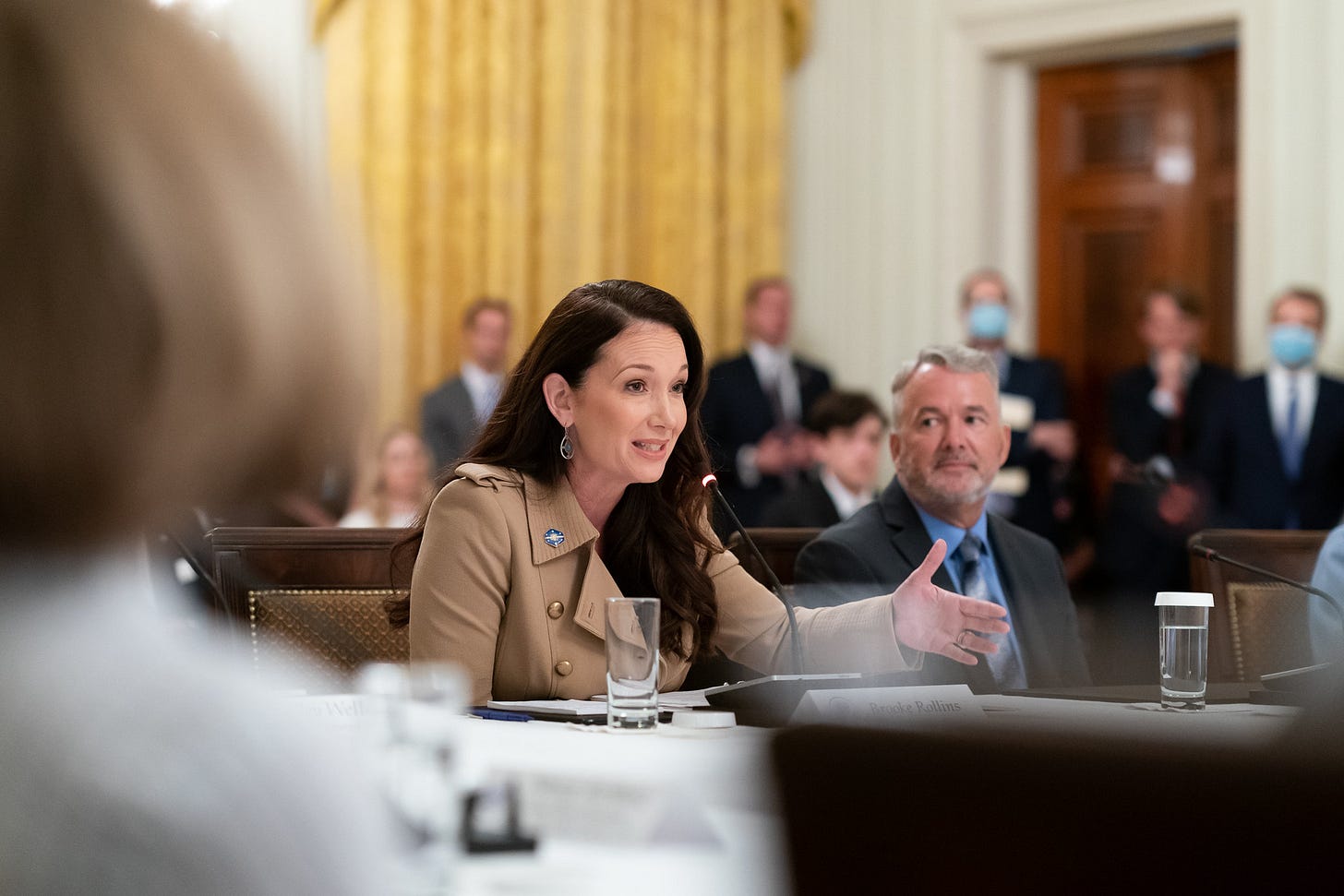Good morning! It’s Thursday, February 13, 2025. Election Day 2025 is 264 days away. Election Day 2026 is 628 days away.
Has any industry benefitted more from Donald Trump’s two presidencies than the Pocket Constitution business?
Just think of all the obscure constitutional provisions that he’s resurrected from irrelevance: the Emoluments Clause. The Impeachment Clause. The Insurrection Clause. Not to mention, if we were to delve deeper into the U.S. Code, statutes like the Impoundment Control Act and the Posse Comitatus Act.
Less than a week after he was re-elected, Trump made a splash by bringing up the Recess Appointments Clause (found in Article II, Section 2 of the Constitution), which allows the president to temporarily install appointees without Senate approval when the chamber is on recess.
“Any Republican Senator seeking the coveted LEADERSHIP position in the United States Senate must agree to Recess Appointments,” Trump wrote in November. (In recent years, the Senate has generally avoided formally recessing in order to prevent presidents from making recess appointments.)
The three candidates who were running for Senate Majority Leader at the time — Sens. John Cornyn (R-TX), Rick Scott (R-FL), and the eventual winner, John Thune (R-SD) — all quickly responded, rushing to signal their openness to Trump’s plan.
Personally, I think it’s possible that that was the whole point of the exercise: Trump just wanted to make sure that he could make any demand, and all three of the contenders would comply.
If, on the other hand, Trump was genuinely thinking he might need recess appointments to elevate his more controversial nominees — well, then it turns out he was worried over nothing. Today, the last of his most endangered nominees is on track to be confirmed by the Senate without much of a problem.
Robert F. Kennedy Jr.’s approval as Secretary of Health and Human Services will complete a successful three-peat — following the confirmations of Defense Secretary Pete Hegseth last month and of Director of National Intelligence Tulsi Gabbard yesterday — that seemed far from certain at several points along the way.
The only black mark on Trump’s confirmation record will have been his first pick for Attorney General, Matt Gaetz, whose nomination was withdrawn eight days after it was announced. Frankly, it now seems possible that Gaetz may have been able to get through if only he had waited it out.
To be clear, Trump’s ease in confirming his initial nominees continues a very consistent pattern for the last few decades. Below, I’ve charted the success rates of presidential picks at the beginning of their terms (counting all nominees for Cabinet or Cabinet-level positions until every slot is filled at the start of a new administration).1
As you can see, most recent presidents — like Trump in both his terms — have suffered a sole loss before succeeding in confirming the rest of their top choices. Out of the 123 debut Cabinet-level nominees put forward by Trump’s six predecessors, 115 were confirmed.
But none of them put forward as many divisive picks as Trump. Here, it can be instructive to look back at some of the nominees who didn’t make it through in previous eras.
Of the eight pre-2025 failures recorded above, three (!) withdrew amid scandals involving their employment of undocumented immigrants: Andrew Puzder, Trump’s first-term pick for Labor Secretary (who also faced allegations of sexual abuse); Linda Chavez, George W. Bush’s initial nominee for Labor; and Zoë Baird, Bill Clinton’s first pick to be Attorney General. (Clinton also had an almost-pick for AG, Kimba Wood, who was dropped for the same reason. She isn’t counted above because she was never formally announced for the role.)
Barack Obama’s three debut Cabinet failures — the modern-day high watermark for a new president — were Health and Human Services pick Tom Daschle, who pulled out after it was revealed he owed $140,000 in back taxes, and Commerce nominees Bill Richardson, who was being investigated by a grand jury for pay-to-play allegations, and Judd Gregg, who belatedly decided he didn’t want to cross party lines to join Obama’s team.
Then there’s Neera Tanden, Biden’s nominee to be director of the Office of Management and Budget, who withdrew after members of both parties raised concerns about her tweets criticizing senators.
And finally George H.W. Bush’s pick to be Defense Secretary, John Tower — the only one of the group to not just withdraw, but actually be defeated on the Senate floor — who was accused of drunkenness and womanizing.
More than three decades later, Hegseth faced similar — but more pronounced — issues as Tower, including at least one sexual assault allegation, claims that he financially mismanaged several organizations and drank on the job while leading them, and an accusation from his former sister-in-law that he was abusive to his ex-wife.
Kennedy has also been accused of sexual assault, while also facing a suite of other controversies, from his anti-vaccine comments to his suggestion that Covid-19 was genetically engineered to spare Chinese and Jewish people to a bizarre history with animals.
Gabbard, meanwhile, faced questions about her 2017 meeting with then-Syrian dictator Bashar al-Assad, her promotion of misinformation about Russia’s invasion of Ukraine, her ties to a fringe religious group, and her defense of leaker Edward Snowden.
The trio makes some of the doomed nominees of the recent past seem downright quaint; indeed, they each went through periods where it seemed like their nominations were in doubt. Trump briefly entertained ditching Hegseth for Ron DeSantis or another candidates for Defense Secretary. Senate GOP vaccine advocates appeared skeptical of Kennedy (as did some pro-life Republicans); defense hawks were none too pleased with Gabbard.
How did all three end up sailing through? Here are some of the key factors:
* Key concessions. GOP senators didn’t let any of the nominees through without exacting a pound of flesh. During their confirmation processes, Hegseth promised to quit drinking and reversed himself on women in the military; Gabbard came out in support of a key surveillance tool she had previously opposed; and Kennedy announced sudden conversions on vaccines and abortion.
* Primary threats. There’s always high pressure on senators to unite behind a new president from their party, but it was especially high this year. GOP activists (from Meghan McCain to Elon Musk) promised to go to war on behalf of Trump’s nominees, besieging Republican senators with calls and promising primary challenges against any who stepped out of line. Sen. Joni Ernst (R-IA), an initial Hegseth skeptic, was the first to face one of these campaigns; the experience was enough to flip her, and seemingly, enough of a warning sign for other Republicans as well.
* JD Vance. Several senators have explicitly credited the VP with helping persuade them to back Trump’s controversial picks. Vance clearly has the trust of his former colleagues; he’ll be a key Capitol Hill emissary to watch in the months ahead.
* A changed Senate. I was curious to see how often senators have voted against Cabinet picks submitted by a new president of their own party in the past.2 The answer? Not often. The record-holder in this area is first-term Donald Trump, especially in his lower-profile nominees. (Each president gets to designate which officials they consider to be “Cabinet-level”: these appointees, like the Director of National Intelligence or the Administrator of the Environmental Protection Agency don’t lead executive departments, but still get to join Cabinet meetings.)
Why the steep drop-off from Term One to Term Two? Well, one reason might be that half of the Republican senators who were willing to vote against Trump’s picks in 2017 are no longer in office, symbolic of the president’s increasing grip on the party. Then-Sen. John McCain (R-AZ) accounts for two of the nine votes; then-Sens. Cory Gardner (R-CO) and Ben Sasse (R-NE) account for two more. (Sitting Sens. Susan Collins (R-ME), Lisa Murkowski (R-AK), and Rand Paul (R-KY) were the other dissenters.)
According to FiveThirtyEight, less than half of the Republican members of Congress who were in office in 2017 are still there today, partially a sign of normal churn — and partially a sign of a party that Trump has transformed.
Along these lines, I couldn’t help but notice that Gabbard was sworn in under a portrait of Ronald Reagan yesterday. Gabbard and “The Gipper” represent two very different foreign policy philosophies;3 it was hard not to see it as something of a passing of the torch.
* Changing conceptions of advice and consent. One Republican lawmaker who has committed himself to promoting Reaganesque foreign policy in his final years in offie is Sen. Mitch McConnell (R-KY), who voted against both Hegseth and Gabbard — making him responsible for two of the four GOP votes against second-term-Trump nominees so far.
I was struck by something McConnell wrote in his statement after the Gabbard vote yesterday: “The Senate’s power of advice and consent is not an option; it is an obligation, and one we cannot pretend to misunderstand. When a nominee’s record proves them unworthy of the highest public trust, and when their command of relevant policy falls short of the requirements of their office, the Senate should withhold its consent.”
It’s not hard to figure out who McConnell thinks is “pretend[ing] to misunderstand” their “advice and consent” role: his own GOP colleagues, several of whom have said in statements that they are supporting Trump nominees not because of their merits — but because Trump nominated them. “Having won the election decisively, I believe President Trump has earned the right to appoint his own cabinet, absent extraordinary circumstances,” Sen. John Cornyn (R-TX) said when announcing his support for Gabbard. “President Trump chose Tulsi Gabbard to be his point person on foreign intelligence,” Sen. Bill Cassidy (R-LA) added. “I will trust President Trump on his decision and vote for her confirmation.”
Having looked through all the roll call votes on initial Cabinet nominees since George H.W. Bush to make the above charts, it’s striking to see the evolution in how senators view their “advice and consent” responsibilities. Decades ago, it was common for nominees to sail through with bipartisan support: Bill Clinton’s entire first Cabinet was confirmed unanimously. Now, senators have gone in two opposite directions: senators from the opposition are much less likely to support presidential nominees.
Meanwhile, senators from the president’s party — while not necessarily voting at a for or against nominees at a different rate — often don’t even pretend to support the picks they vote for, but explicitly say they’re supporting a confirmation simply out of deference to the president.
* Harry Reid. None of Trump’s most controversial nominees have received more than 60 votes, which was the level of support Cabinet nominees used to need until then-Democratic leader Harry Reid forced a rules change in 2013. It’s interesting to consider what Trump’s Cabinet nominees would look like in a world where that didn’t happen.
Of course, it’s possible that the so-called “nuclear option” would have been invoked anyways by now — although I’m not positive of that. McConnell resisted Trump’s pressure to eliminate the legislative filibuster in his first term (although he did expand Reid’s move with respect to nominees); Sens. Joe Manchin (I-WV) and Kyrsten Sinema (I-AZ) prevented Democrats from messing with the rule under Biden; and Thune has seemed resistant to fiddling with Senate rules to accelerate Trump’s agenda.
Who knows if the 60-vote standard would still be here if not for Reid, but the Nevada Democrat certainly made it easier.
Just because the Senate is quickly churning through Trump’s Cabinet picks, it doesn’t mean that the confirmation battles are over.
The next fights to watch will be over some of Trump’s more controversial picks for other administration posts, like Pentagon foreign policy pick Elbridge Colby, who has ruffled the feathers of defense hawks; National Counter Terrorism Center Director nominee Joe Kent, who has extremist ties; and Charles Kushner, who Trump tapped to be U.S. ambassador to France despite his sordid past.
Trump has also elevated nominees who failed to be confirmed in his first term — like the aforementioned Andrew Puzder, who Trump has nominated to be ambassador to the European Union — setting up a clean test of how much the Senate GOP has changed in eight years.
Maybe Trump will still need to use recess appointments after all. Or, on second thought, maybe not.
Reconciliation update
House and Senate Republicans are still at odds over how to advance President Trump’s agenda. The Senate Budget Committee approved a framework Wednesday for a $342 billion package that would focus on boosting defense and border security spending, leaving extending the 2017 tax cuts for another bill.
Meanwhile, the House Budget Committee is set to vote today on a very different blueprint, which would call for $300 billion in new defense and border spending and $4.5 trillion in tax cuts and $1.5 trillion in spending cuts and a $4 trillion increase to the debt ceiling — all in one package.
But, as is often the case with House Republicans, it’s unclear if GOP leaders have enough votes to advance their plan: some members of the House Freedom Caucus are pushing for at least $500 billion in additional spending cuts, as well as work requirements for Medicaid and food stamps.
According to Politico, the Trump administration is split on whether to endorse the House or Senate approach: Vice President JD Vance is reportedly among those who wants to split the president’s agenda into two bills, while Treasury Secretary Scott Bessent is pushing for one.
As I wrote last week: “Republican lawmakers may be loath to disagree with Trump, but they have no problem disagreeing with each other.” The split-screen between Republicans easily approving Trump’s Cabinet nominees while they squabble amongst themselves over legislative process underlines that point perfectly.
More news to know
President Trump and Russia’s Vladimir Putin spoke over the phone on Wednesday, laying the groundwork for new negotiations over ending the war in Ukraine. Trump signaled plans to meet with Putin in-person, potentially in Saudi Arabia.
Before the talks kick off, Defense Secretary Pete Hegseth made clear that the U.S. views two of Ukraine’s key asks — joining NATO and reclaiming its pre-2014 borders — as “unrealistic.”
A Clinton-appointed federal judge ruled that Trump’s buyout plan for federal workers could proceed, after previously pausing the program while he considered the case. The judge decided that the unions who sued to stop the buyout lacked standing to bring the case.
The Trump administration said after the ruling that about 75,000 employees had taken the deal, which is no longer available. “The Fork in the Road is Closed,” an email announced to employees.
Eight inspectors general fired last month are suing for their jobs back, citing Trump’s failure to follow a law requiring he give Congress an explanation and 30-day notice for their dismissals.
In a separate case, the Justice Department signaled its plans to ask the Supreme Court to overturn a 1935 precedent that prevents the president from firing members of independent agencies like the Federal Communications Commission (FCC), Federal Trade Commission (FTC), and National Labor Relations Board (NLRB).
As Democrats raise concerns about whether Trump will continue following court orders, White House press secretary Karoline Leavitt said Wednesday that “the real constitutional crisis” is taking place within the judicial branch. She accused judges halting Trump’s orders of “acting as judicial activists rather than honest arbiters of the law.”
Attorney General Pam Bondi announced plans to sue the state of New York over its law allowing undocumented migrants to receive driver’s licenses.
X, the social media company owned by White House adviser Elon Musk, agreed to pay Trump around $10 million to settle a lawsuit the president brought over his post-January 6th suspension from the platform (which predated Musk’s ownership of the app).
Deputy Acting Attorney General Emil Bove has been leading the Trump administration’s efforts to purge the Justice Department of officials who investigated January 6th. But he helped investigate January 6th in the months after the attack.
Eric Adams, the Democratic mayor of New York City, is considering running for re-election as a Republican. Trump’s Justice Department dropped the corruption charges against him earlier this week.
The Senate Ethics Committee has not issued any ethics sanctions against senators or Senate staffers for 18 consecutive years.
The day ahead
President Donald Trump will sign executive orders on tariffs at 1 p.m. before meeting with Prime Minister Narendra Modi of India at 4 p.m. Trump and Modi will hold a joint press conference at 5:10 p.m. and have dinner together at 5:40 p.m.
Vice President JD Vance will visit the site of the Dachau concentration camp. He is in Germany to attend the Munich Security Conference, which kicks off tomorrow.
The Senate will vote at 10:30 a.m. to confirm Robert F. Kennedy Jr. as Secretary of Health and Human Services, followed by a vote to confirm Brooke Rollins as Agriculture Secretary. Then, at 1:45 p.m., the chamber will hold procedural votes advancing the nominations of Howard Lutnick to be Commerce Secretary and Kelly Loeffler to be head of the Small Business Administration.
The House will vote at around 10:30 a.m. on the Agent Raul Gonzalez Officer Safety Act, which would make undocumented immigrants “inadmissible, deportable, and ineligble for immigration relief (including asylum)” if they are convicted for fleeing by car from U.S. Border Patrol agents within 100 miles of the border. The bill is named for a border agent who died in an ATV accident in 2022 while pursuing migrants who crossed the border illegally.
The House Budget Committee will meet at 10 a.m. to consider the House version of the budget resolution to unlock the reconciliation process.
*All times Eastern.
Note that multiple nominees for a single position are included in some presidencies, if it took multiple tries to get someone confirmed. Other variation in the denominators is because some presidents (especially Bush I) kept Cabinet officials from their predecessors, and because different presidents have designated different roles as “Cabinet-level.” (The above chart uses the roles that a president gave that designation to at the start of their term.)
Not counting independents who caucus with the president’s party.
One example of the Trump-to-Reagan change: it’s being reported today that Elon Musk is now trying to dismantle the National Endowment for Democracy, an organization that was Reagan’s brainchild.









Gabe, I'm reflecting on the depth of civics/political process learning I have been doing due to your columns. It seems to me that the citizens of our country pay attention to, and know a bit more about many aspects and representatives of our government than we did years ago. I suppose it can create overwhelm along with all the drama topics and representatives generate.
Thanks for the objective analysis today.
I don’t care one iota if the Republicans squabbled OR if past clauses, aided President Trump. Republicans that voted for unqualified cabinet members are cowards and minions. You are using politics as a viable excuse for incompetence. DuringTrump‘s first presidency, which real historians saw as a failure, there were ladies and gentlemen who were buffers to HIS incompetence. Now, the staff, is more deranged than the president himself.
Journalists such as Brett Stevens writes in his column in the New York Times, “there are things I like that Trump has done.” WHAT? So minor changes that you agree with Brett are worth mentioning, in spite of an impending constitutional crisis? We are in danger of losing our democracy and more importantly, our Republic.
Read Tom Friedman‘s article instead, and find out how Netanyahu uplifted Hamas through payments through Qatar . Netanyahu is a right wing crook and he LOVES Trump. He is opposed to a two state solution, and will do anything to stay out of jail.
I am an RN and was head nurse of an emergency room . We saved lives, because of science and medicine and it is inconceivable to me that supposed learned men and women would vote to have someone as manipulative, disgusting, dishonest and anti vaccine as RFK to a cabinet position., not to mention his love of conspiracy theories. We are losing because we worship money, notoriety, bombastic behavior and supposed genius.
Remember, please remember, that very learned and smart and wealthy Germans conspired with Hitler to slaughter millions.
More important than money and yes, genius is character, empathy, and righteousness.